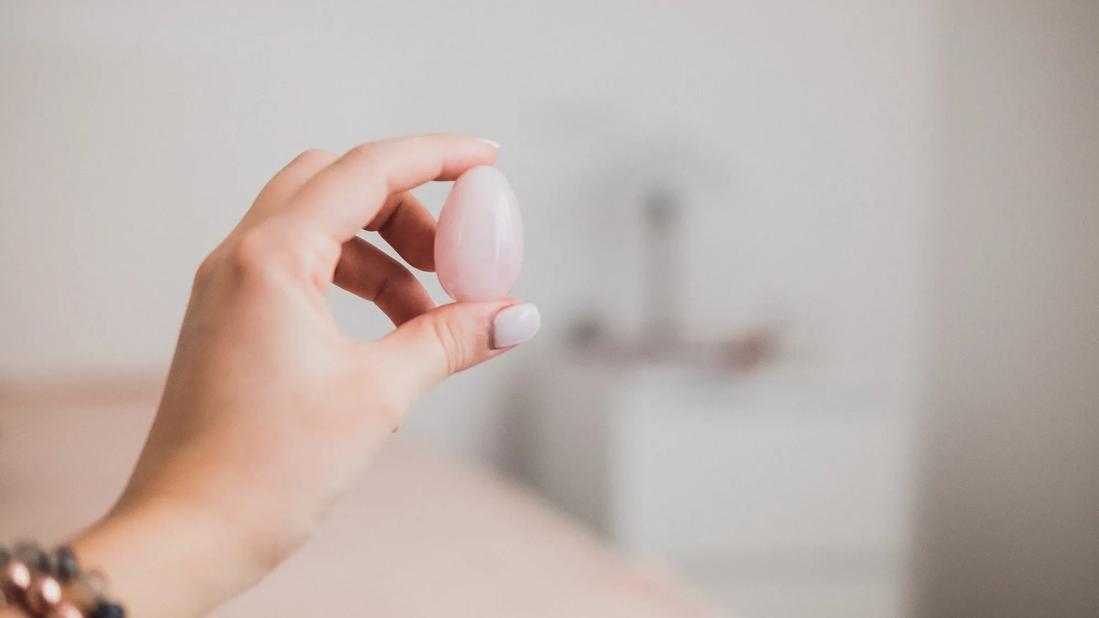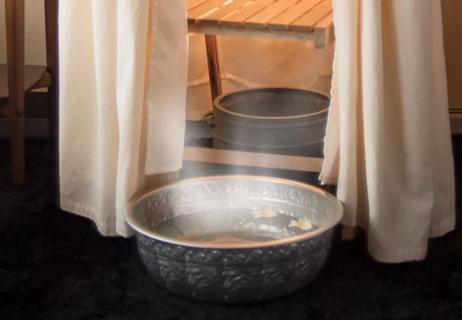They have no proven benefits but can cause infection, damage your pelvic floor muscles and get stuck inside you

Ooooh, crystals! If you’re the spiritual type, you may be intrigued by the idea of yoni eggs: egg-shaped stones that go inside your vagina, supposedly to promote sensuality, femininity and healing energy.
Advertisement
Cleveland Clinic is a non-profit academic medical center. Advertising on our site helps support our mission. We do not endorse non-Cleveland Clinic products or services. Policy
But think twice before using these semi-precious stones.
Ob/Gyn Suchetha Kshettry, MD, talks about the risks of yoni eggs and what to try instead.
Yoni eggs are egg-shaped stones that are typically made of materials like jade, quartz or obsidian. Some claim that inserting these stones into your vagina can do everything from strengthen your pelvic floor to improve your sex life.
“The problem is that there’s no hard science to show that using a yoni egg can do any of these things,” Dr. Kshettry clarifies. “What’s worse, they could actually cause harm instead.”
So, where did beliefs about yoni eggs even come from? It’s not clear. Yoni is a Sanskrit word that means space, source or womb. And though many people claim yoni eggs are Chinese in origin, research shows no historical evidence to confirm that.
Today, the use of yoni eggs has mostly been popularized by celebrities and social media influencers. You might also hear them called:
However pretty and sparkly they may be, yoni eggs haven’t been shown to have any scientific medical use. But proponents claim they can:
Advertisement
“Again, there’s no real research to support these benefits,” Dr. Kshettry reiterates. “Putting a crystal egg inside your vagina won’t have any positive impact on the regularity of your menstrual cycle or the severity of your PMS.”
Most medical professionals agree that yoni eggs aren’t safe. In addition to not having any proven benefits, there are a few ways that they could actually cause harm.
“Any foreign body in the vagina can negatively impact the way it functions, which can lead to increased risks,” Dr. Kshettry warns. She explains some of the possibilities.
Your pelvic floor is a network of muscles in your pelvis that support organs like your bladder, bowels, rectum and urethra. Pelvic floor training has been shown to strengthen these muscles. But when it comes to using yoni eggs, the opposite is true: To keep the egg in your body, you have to continually clench your vaginal muscles. And that can actually cause harm.
“When you use a yoni egg, you’re not doing the contract-release-relax sequence that pelvic floor training requires,” Dr. Kshettry explains. “That can lead to painful muscle spasms in your pelvic floor.”
Though gemstones like jade and onyx might seem sturdy and hard, they’re actually semi-porous. That means there’s space for gas and fluids to pass through them — but it also leaves space for bacteria to grow, which can cause infections.
“Semi-porous materials are also difficult to fully clean, so bacteria may stick around and fester,” Dr. Kshettry stresses.
Gemstones can chip or crack, leaving rough spots that can do damage.
“Putting any foreign body inside your vagina, including a stone egg, can cause irritation, scratches or tears,” Dr. Kshettry says. Ouch!
Wounds also invite bacteria, which, again, can lead to infections.
Typically associated with leaving a tampon in too long, toxic shock syndrome (TSS) is essentially a ramped-up bacterial infection that can lead to serious health issues and even death.
“Keeping anything inside your vagina for an extended period of time increases your risk for toxic shock syndrome,” Dr. Kshettry says.
Plus, if yoni eggs cause any scratches in your vagina, it becomes easier for bacteria to enter your bloodstream — another risk factor for TSS.
It sounds like something straight out of Grey’s Anatomy, but it can happen: Because of their size, shape and slippery material, it may be difficult to retrieve a yoni egg from your vagina. Not exactly an emergency room trip you want to make.
Skip the yoni eggs. Whether you’re trying to relieve menstrual cramps, end urinary incontinence or just improve your sex life, there are many safer, medically approved alternatives to try.
Advertisement
Learning to properly perform pelvic floor exercises (also known as Kegels) can help strengthen your pelvic floor muscles. This can:
But a word of warning: Doing these exercises incorrectly can make existing pelvic floor issues worse. If you’re experiencing symptoms like pelvic organ prolapse or incontinence, don’t try Kegels on your own.
“If you have a weak pelvic floor, it’s really important to see a specialist,” Dr. Kshettry urges. “They can direct you in the types of exercises that will be most helpful to you, and they may refer you to a pelvic floor physical therapist.”
If you have irregular periods, including severe menstrual cramps, ask a gynecologist about the possibility of underlying conditions, like ovarian cysts or uterine fibroids.
“If you have excessive cramps, PMS symptoms or other menstrual irregularities, have a conversation with your doctor about options to regulate your cycle, alleviate your pain and address other concerns,” Dr. Kshettry advises.
Their recommendations may include:
Advertisement
If you’re struggling with low libido, painful sex or orgasms, a healthcare provider can help with all of that, too — in ways that a stone egg certainly can’t.
Common causes may include:
Just as doctors recommend against douching because it can change the pH balance of your vagina (which is a bad thing), using a yoni egg — or any foreign object — in your vagina can do the same.
“Your vagina is self-cleaning, so there’s not a lot that needs to be done down there to help keep it in balance,” Dr. Kshettry says. “All trends wax and wane, but when it comes to vaginal and reproductive health, less is more.”
In other words, leave your vagina alone. Unless you have a specific medical issue, there’s no reason to do much to your vagina at all.
If all of that guidance sounds like a broken record, it’s for good reason. When it comes to sexual and reproductive health, a healthcare provider should always be your first line of defense — not questionable DIY hacks that you may see on social media.
“There are women’s health providers who specialize in all different aspects of women’s health,” Dr. Kshettry says. “There are physicians who specialize in sexual health and wellness, mental health professionals with a focus on women’s health, and subspecialists who are trained to address the various aspects of pelvic organ prolapse, abnormal bleeding and PMS. It’s all about finding the right people to help.”
Advertisement

Sign up for our Health Essentials emails for expert guidance on nutrition, fitness, sleep, skin care and more.
Learn more about our editorial process.
Advertisement

Choose 100% cotton (the best material for underwear) and put on a fresh pair (at least) daily

These herbal pellets aren’t backed by science and can be harmful

Instead of protecting you from infections, douching your vagina can do the very opposite

Most tears down there are mild and heal on their own, but some require medical treatment

A gynecologist shares what you can do (and what you can skip)

This hot seat might be too hot to try

It’s important to angle it toward your rectum or back, along the natural curve of your vaginal canal

Even small moments of time outdoors can help reduce stress, boost mood and restore a sense of calm

A correct prescription helps your eyes see clearly — but as natural changes occur, you may need stronger or different eyeglasses

Both are medical emergencies, but they are very distinct events with different causes